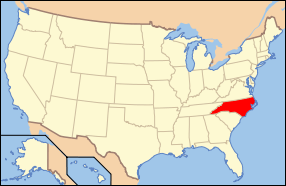Lansing Historic District
|
Lansing Historic District | |
  | |
| Location | Roughly bounded by NC 194, G & A Sts., Lansing, North Carolina |
|---|---|
| Coordinates | 36°29′59″N 81°30′39″W / 36.49972°N 81.51083°WCoordinates: 36°29′59″N 81°30′39″W / 36.49972°N 81.51083°W |
| Area | 32 acres (13 ha) |
| Built by | Greer, Drew; Ham, Troy; and Mullis, Dan |
| Architectural style | Colonial Revival, |
| NRHP Reference # | 11000544[1] |
| Added to NRHP | August 18, 2011 |
Lansing Historic District is a national historic district located at Lansing, Ashe County, North Carolina. The district encompasses 62 contributing buildings in the town of Lansing. The district includes commercial, residential, and institutional buildings dating to the early- to mid-20th century. Notable buildings include the Bank of Lansing (c. 1916), French Young Barber Shop Building (c. 1920), Sapp Department Store (c. 1955), Lansing Mill Company mill (c. 1940), Coble Dairy Plant (c. 1942), Lansing Presbyterian Church (1928), Lansing United Methodist Church (1944), French Young House (c. 1930), and Sapp House (c. 1950).[2]
It was listed on the National Register of Historic Places in 2011.[1]
References
- 1 2 "National Register of Historic Places Listings". Weekly List of Actions Taken on Properties: 8/15/11 through 8/19/11. National Park Service. 2011-08-26.
- ↑ Sherry Joines Wyatt (January 2011). "Lansing Historic District" (pdf). National Register of Historic Places - Nomination and Inventory. North Carolina State Historic Preservation Office. Retrieved 2014-08-01.
This article is issued from Wikipedia - version of the 11/30/2016. The text is available under the Creative Commons Attribution/Share Alike but additional terms may apply for the media files.

